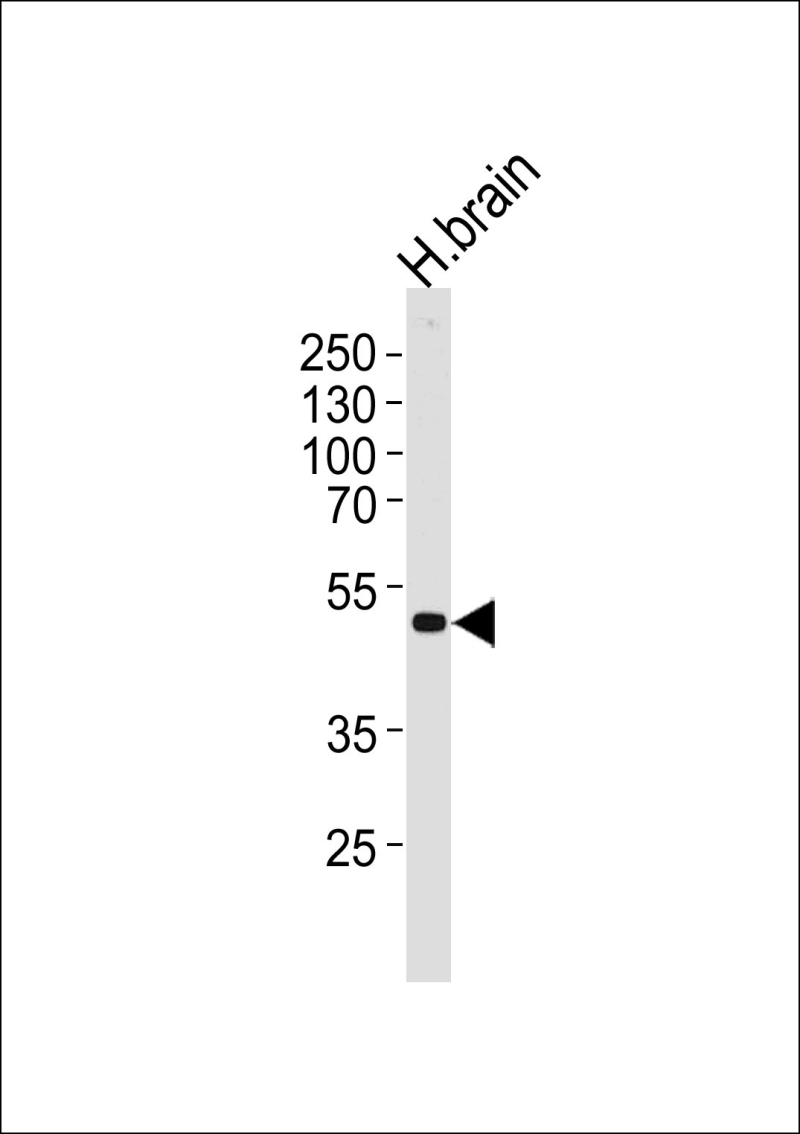
| WB | 1/1000 | Human,Mouse,Rat |
| IF | 咨询技术 | Human,Mouse,Rat |
| IHC | 咨询技术 | Human,Mouse,Rat |
| ICC | 技术咨询 | Human,Mouse,Rat |
| FCM | 咨询技术 | Human,Mouse,Rat |
| Elisa | 咨询技术 | Human,Mouse,Rat |
| Aliases | ATP-sensitive inward rectifier potassium channel 12, Inward rectifier K(+) channel Kir22, IRK-2, Inward rectifier K(+) channel Kir22v, Potassium channel, inwardly rectifying subfamily J member 12, KCNJ12, IRK2, KCNJN1 |
| Entrez GeneID | 3768 |
| WB Predicted band size | 49.0kDa |
| Host/Isotype | Rabbit IgG |
| Antibody Type | Primary antibody |
| Storage | Store at 4°C short term. Aliquot and store at -20°C long term. Avoid freeze/thaw cycles. |
| Species Reactivity | Human |
| Immunogen | This KCNJ12 antibody is generated from rabbits immunized with a KLH conjugated synthetic peptide between 405-433 amino acids from the C-terminal region of human KCNJ12. |
| Formulation | Purified antibody in PBS with 0.05% sodium azide. |
+ +
以下是关于KCNJ12抗体的3篇参考文献示例(注:以下为模拟内容,实际文献需通过学术数据库检索确认):
---
1. **文献名称**:*KCNJ12 Expression and Function in Cardiac Repolarization*
**作者**:Smith A, et al.
**摘要**:研究利用KCNJ12特异性抗体,发现Kir2.2通道在人类心室肌细胞中的表达异常与心律失常相关,抗体通过免疫荧光和Western blot验证了其在心脏组织中的定位。
2. **文献名称**:*Role of KCNJ12 in Neuronal Potassium Homeostasis*
**作者**:Chen L, et al.
**摘要**:通过KCNJ12抗体免疫组化分析,揭示Kir2.2在小鼠海马神经元中的分布,并证明其缺失导致突触传递异常,提示与癫痫等神经系统疾病的潜在关联。
3. **文献名称**:*KCNJ12 as a Biomarker in Gastrointestinal Stromal Tumors*
**作者**:Wang Y, et al.
**摘要**:使用KCNJ12抗体进行免疫组织化学筛查,发现肿瘤组织中Kir2.2表达显著上调,提示其可能作为胃肠道间质瘤的新型诊断标志物。
---
如需具体文献,建议通过PubMed或Google Scholar检索关键词“KCNJ12 antibody”或结合研究领域(如“KCNJ12 + 疾病名称”)获取最新结果。
The KCNJ12 antibody targets the potassium inwardly rectifying channel subfamily J member 12 (KCNJ12), a protein encoded by the *KCNJ12* gene. KCNJ12 is part of the inward rectifier potassium channel family, which plays critical roles in maintaining resting membrane potential and regulating cellular excitability. These channels are particularly important in excitable tissues, such as cardiac muscle, skeletal muscle, and neurons. KCNJ12 forms heteromeric channels with other Kir subunits (e.g., KCNJ2/Kir2.1) to modulate potassium ion flow, influencing processes like action potential duration and muscle contraction.
Antibodies against KCNJ12 are primarily used in research to study its expression, localization, and function in physiological and pathological contexts. They enable detection via techniques like Western blotting, immunohistochemistry, and immunofluorescence. Dysregulation of KCNJ12 has been implicated in disorders such as cardiac arrhythmias, skeletal muscle diseases, and neurological conditions. For example, mutations in related Kir genes are linked to Andersen-Tawil syndrome and familial hyperaldosteronism, highlighting the channel's clinical relevance.
Research using KCNJ12 antibodies also explores its role in cancer, as altered potassium channel activity may influence tumor progression. Commercial KCNJ12 antibodies are typically validated for specificity and cross-reactivity, though variability exists depending on epitope targets and experimental conditions. Continued study of KCNJ12 and its interactors may reveal therapeutic targets for channelopathy-related diseases.
×